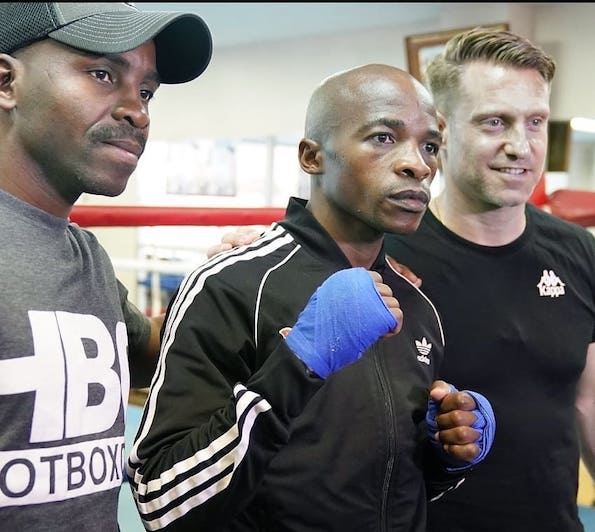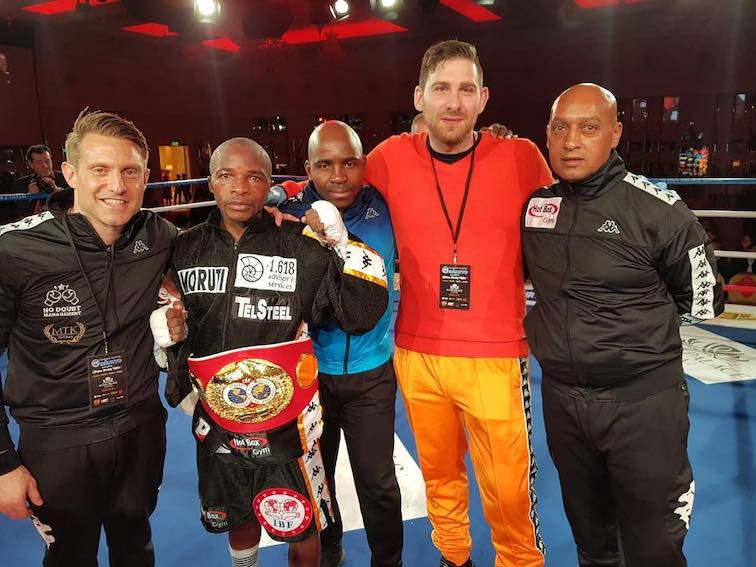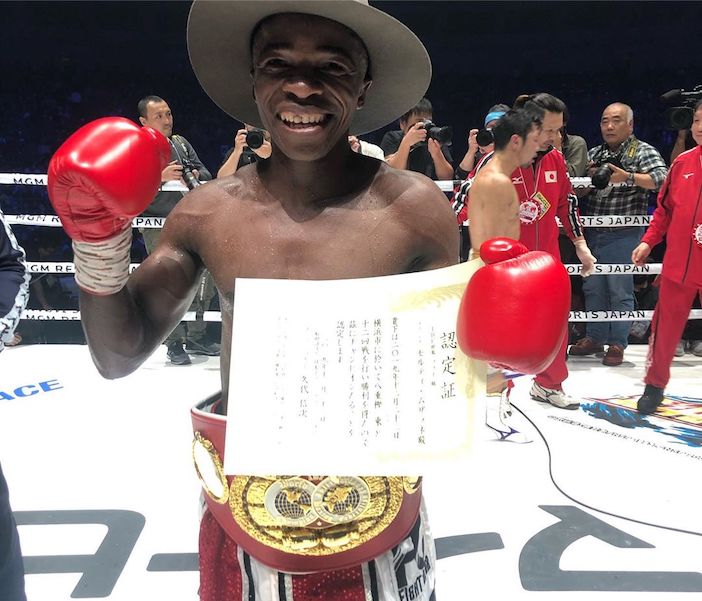As boxers the world over are coming to terms with the uncertainty surrounding where and when their next fight will be, it is an all too familiar situation for IBF flyweight ruler Moruti Mthalane.
During his initial reign as a world champion from 2009 to 2014, the South African was plagued by inactivity; deemed too high risk, for comparatively low reward, by his rivals.
In January 2014, Mthalane vacated his title when the winning purse bid for his mandatory defence against Amnat Ruenroeng was amongst the lowest in the sanctioning body’s history. His then-manager, Nick Durandt, claimed Mthalane would have taken home R60,000 (the equivalent of $5,529 at the time).
Mthalane recaptured his title four years later against the then-undefeated, Muhammad Waseem in Kuala Lumpur. In his second spell as champion, fights have been easier to come by, with the South African making three defences of his title – one in Macao and two in Japan. Despite the current uncertainty, he remains optimistic that his services will remain in demand once some semblance of normality returns to the sport.
However, he did reveal that the Covid-19 pandemic has cost him a well deserved homecoming bout.
“My manager Colin Nathan was in connection with some people here in South Africa,” Mthalane told Boxing Social. “We were looking to defend my title in June, then the outbreak happened, and everything had to stop. It was not finalised, but negotiations were going very well. My last fight in South Africa was in October 2017 (against Ardin Diale). For three years now, I haven’t fought in South Africa.
“My wish is to fight at least once before the end of the year. I’ll be very much happy if I can fight in October, November or December. That’s what I’m praying for.”

Mthalane (39-2, 26 KOs) closed out 2019 in impressive fashion, halting Akira Yaegashi in the ninth round of their contest in December. Yaegashi, a three-weight world champion, has been amongst the most fan-friendly fighters of the last decade. The Japanese warrior has been involved in several ‘Fight of The Year’ contenders over the span of his distinguished career, most notably his 2011 thriller with Pornsawan Porpramook. At 36, Yaegashi knew it would most likely be his final chance to experience world title glory once again and, after a quiet opening two rounds, he went to war with Mthalane. The champion was sharper and stronger, but Yaegashi’s tenacity and will to win impressed Mthalane.
“I thought I performed very well,” he said. “Akira Yaegashi came out smoking, he wanted to be a champion. I’m proud of myself, I did very well. He was not an easy opponent, but I performed well because I won by stoppage.”
While much is made of the difficulty fighters have receiving fair officiating when boxing abroad, Mthalane is comfortable playing the part of the road warrior, having fought in six countries.
In all his fights outside of South Africa, he has only lost once, suffering a sixth round TKO defeat to future Hall of Famer Nonito Donaire when a cut above Mthalane’s eye was deemed too severe for him to continue.
Mthalane leaves no stone unturned in training to ensure he won’t have regrets or excuses in defeat.
“It’s not easy to fight away from home,” he said. “When you are at home all the fans are picking you up, but when you are away [from home] it is very difficult because you have no supporters. I’m used to it now. It doesn’t disturb me at all. If I lose a fight overseas, then I would have lost it even if I was at home. I always make sure my preparation goes very well. I ensure that I’m 100 per cent ready, mentally and physically for the fight. I think that helps me a lot.”

Despite his diligence in the gym, Mthalane still feels a sense a trepidation when competitive bouts go to the scorecards on the road. This was the case in his second defence against Masayuki Koroda. The challenger started strong and all three judges had him ahead after three rounds. Ultimately, Mthalane’s experience was the deciding factor as he won a unanimous decision (117-11 and 116-112 twice). Yet Mthalane was anxious as both fighters stood in the middle of the ring awaiting the result.
“I was scared,” he said. “I asked my coach [Colin Nathan] after the 12th round: ‘Do you think we won the fight?’ I do believe the fight was close, but when I watched it on the tape, I saw that I won convincingly. When you are not at home and it goes 12 rounds you are always nervous, you never know, maybe they will give the home fighter the decision, but the judges made it fair because I won on points.”
When Mthalane talks, his joy is infectious; he often laughs as he recalls his fights. This is in stark contrast to just a few years ago. Having won the IBF title in 2009, against Julio Cesar Miranda, the South African believed that big fights would follow. They didn’t.
He reached the nadir in 2013 when he was inactive for the entirety of the year. A mandatory title defence against Silvio Olteanu had been scheduled to take place in Germany in October of that year, after SES Promotions won the right to stage the contest with a winning purse bid of $12,500. As champion, Mthalane would have received 85 per cent equating to $10,625. On the week of the fight, Olteanu withdrew citing a hand injury. It was then Mthalane became jaded by the sport.
“It was frustrating,” he said. “I ended up hating boxing. I nearly stopped boxing. I nearly walked away because I was very frustrated. I didn’t know what to do. I think those years wasted a lot of time in my career. I think I would have achieved more if [in my first title reign], I’d got more chances to fight, but I was struggling to get fights. I don’t know what the problem was.
“My family played a very important role. My friends and people who believed in me always supported me; they could see there was boxing still in me. It wasn’t like I was finished; it was just because I didn’t get fights. They said I mustn’t throw in the towel, things will turn around, and it happened. Now I am happy. In 2017, I got three fights, 2018 I got two fights and last year I got two fights, so I’ve been happy these last three years.”

Now that Mthalane’s love for the sweet science has returned, he believes he has two years left in the sport and wants to make the most of the time remaining. Even though he has established himself as a top five flyweight for over a decade now, picking up wins over Zolani Tete, John Riel Casimero and the aforementioned Waseem, he is no longer avoided. At 37, rivals seem to believe that the risk-to-reward ratio is finally in their favour.
Eddy Reynoso, trainer of WBC flyweight champion Julio Cesar Martinez, recently told Peleamundo that he would like his charge to unify with Kosei Tanaka or Mthalane before moving up to 115lbs. Given that Tanaka vacated the WBO title in February in his own pursuit of a title at super-flyweight, Mthalane would be, by process of elimination, the primary target for Martinez.
It is a challenge Mthalane relishes and one he believes he would be successful in.
“No one ever wanted to fight me before, but now people want to fight me,” he said with a laugh. “It is each and every boxer’s dream to fight for a unification. I want to fight in a unification bout for the WBC [title], it would be a dream come true.
“I’ve watched Martinez, he’s very good. He’s a young and promising champion, he’s very good, but I’d like to fight him, for sure. We’ll see, I’ll discuss that with my manager, but once everything is well, I’m in! We can make a strategy to defeat him, I do believe I can beat him for sure.”